4 Reasons Your Credit Scores Vary
Every day, you get bombarded with ads telling you how important it is to check your credit score. So you listen and decide to get your score. But every time you check your score it seems to be different, sometimes varying by only a few points, other times off by over a hundred points.
So what’s the deal?
Here are 4 reasons your credit scores may vary:
1. Credit Score Sources
Your credit score comes from the information in your credit report. Considering that you have 3 different credit reports maintained by 3 different credit bureaus, it is important to know which credit reporting agency is furnishing the data used to calculate your credit score.
It is very common that Experian, Equifax, and TransUnion report different information on the same accounts. Some common variations are differing balances, dates of last activity, status, and payment histories.
If you obtain three credit scores from three different credit bureaus, don’t be surprised when they are all completely different.
2. Time
Credit scores, like credit reports, are not static, they are organic, living, breathing, and constantly changing. Credit furnishers constantly report new information to the credit reporting agencies and as the data changes, so do the credit scores.
If you check your credit scores at different times, the scores will vary.
3. Types of Credit Scores
There are many different types of credit scores used for different purposes.
Industry-specific credit scores are used to determine a consumer’s likelihood of defaulting on specific types of loans which are calculated by different formulas.
In short, your auto lender will use a different credit scoring formula from your credit card company or mortgage company to calculate a credit score for you.
4. Credit Score Ranges
Piggybacking on the last reason, these various algorithms used to calculate your credit scores may have different score ranges. The FICO score ranges between 300-850, while the Vantage Score currently ranges between 501-990, and the Experian Plus score has a range of 300-900.
Although 700 is considered a “GOOD” FICO score, it’s considered to be a “FAIR” Plus score, and a “POOR” Vantage Score (v2.0).
The discrepancies in credit score ranges arose because the Fair Isaac Company, developer of the FICO scores, trademarked the 300-850 credit scoring model and would not allow any other companies to use that same range.
In 2011, a US court struck down the trademark which opened the doors for other companies to create credit scoring models with ranges from 300-850. First on the bandwagon is Vantage Score Solutions which recently developed an update to the Vantage score which will lower their credit scoring range to 300-850. (Read more about Vantage score 3.0)
Summary
Know which credit bureau is supplying the data for your credit score.
Know the industry type of credit score you are receiving.
Know the range of the credit score you are obtaining.
And most importantly, don’t focus too much on the score itself. Focus on paying your bills on time, paying down your debt, not applying for credit too often, and keeping your oldest accounts active and open.











